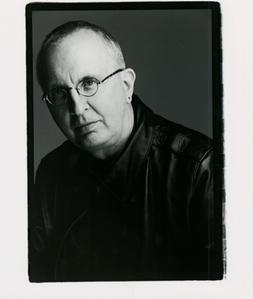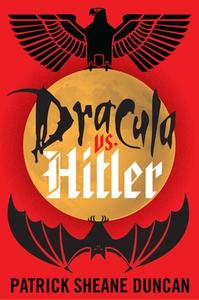
|
|
| photo: David LaPorte | |
Patrick Sheane Duncan wrote the screenplays for Mr. Holland's Opus, Courage Under Fire and Nick of Time. He is the producer of the HBO series Vietnam War Story and cowriter/director of the documentary series Medal of Honor. Dracula vs. Hitler (Inkshares, October 25, 2016) is his third novel.
On your nightstand now:
A nightstand is not nearly enough for me. Next to my nightstand is a bookshelf taller than I, stacked with books I want to read. Right now I am looking forward to The Ancient Minstrel, the last book by Jim Harrison, a man who wrote books that reveal the souls of the common man and woman, dark comic revelations that take place in the margins of life. I'm saving this treat for a special day--maybe when my next book comes out. I'm looking to add to the shelves all the time, searching for some sci-fi in the vein of the brilliant Peter F. Hamilton, who just doesn't write fast enough for my addiction.
On weekends I read nonfiction, and I'm now in the middle of E.J. Dionne Jr.'s Why the Right Went Wrong, a remarkable history of the Republican Party since Eisenhower, and how they got themselves into the Trump troubles they face this year.
Favorite book when you were a child:
My early favorites were the Tom Swift series, first reading those written in the '30s and then the '50s. After I plowed through them the next logical step was the Hardy Boys. I remember I was fond of biographies: examining the lives of other people, using that information to try to make sense of my own life, to somehow discover a way to escape the grim poverty that was my state at the time.
Being a kid of the '50s I read a lot of science fiction and fantasy: Robert Heinlein, Arthur Clarke, Ray Bradbury, Theodore Sturgeon. I still remember the thrill of Andre Norton's Star Rangers.
Your top five authors:
Mark Twain: you can read Huckleberry Finn every 10 years in your life and each time come away with a new insight about the world, humanity, yourself. As a kid it is just a great adventure, as a teenager you begin to see the grand metaphor, in your college years the themes of race and the American psyche poke you in the eye, then in your 30s you delve into the mysteries of friendship, family and the scene where Huck's father is found resonates for a long time.
Kurt Vonnegut's world is a great place to revisit--God Bless You, Mr. Rosewater still delights with every reading, and Slaughterhouse-Five remains a gobsmacking read.
John Steinbeck's East of Eden and The Grapes of Wrath are as important to me as the first time I read them; the Cain and Abel drama and that paean to American poverty and the unbending spirit of man made a deep and lasting impression.
Larry McMurtry's unforgettable characters live long after I've finished one of his books. So much so that I have found myself watching someone on the street or at the mall, or on vacation, and thinking: there's a McMurtry character.
As for my fifth author, it's between Raymond Chandler and Jim Harrison, mostly on the sheer joy of language.
Book you've faked reading:
I don't know if I have ever faked reading a book. I used to finish books I didn't like, feeling some sort of guilt, that I somehow owed it to the author. Nowadays I say to hell with it, if a book hasn't ensnared me in the first hundred pages I drop it and grab another off the stack.  Book you're an evangelist for:
Book you're an evangelist for:
I have throughout the years repeatedly given away copies of Daniel J. Boorstin's trilogy: The Creators, The Discoverers and The Seekers, the sort of history that answers a lot of questions you never thought to ask and makes you go searching for more information.
I also tell everyone to read One Hundred Years of Solitude, Gabriel García Márquez's awe-inspiring dreamscape of a novel.
Book you've bought for the cover:
The Ace sci-fi doubles--as a kid in the '60s I bought them used--they were cheap and there were two of them!
Book you hid from your parents:
I was working at The Coffee Gallery, a beatnik hangout in Holland, Mich., when an enlightened Hope College student gave me a copy of The Autobiography of Malcolm X. This was in 1965 and I was a senior in high school. The town was 99% white--the only black people around were a family from Africa from a missionary exchange. Malcolm X's story had a huge impact on me. I related to being poor, the rough childhood, of course, but it was his outsider status that I connected with the most--being different, smart and angry at your situation. The anger really resonated. The inner rage at the blatant unfairness, the dark side of the American Dream, the impotency of the poor.
I couldn't read the book at home, my mother and her latest man both being racists. At school one of the teachers even told me I shouldn't read such "trash." So, I put the slipcover of another book over it, a tattered A.E. Van Vogt's The Weapon Shops of Isher. The forbidden designation, as usual, only made the book more precious.
Book that changed your life:
I was in Vietnam and an old girlfriend sent me a copy of Catch-22. Reading that darkly funny book in the midst of the military madness surrounding me was so surreal that I had to stop reading it oft-times just to protect my own sanity. The trouble with that magnificent novel is that as ludicrous as the characters may be, as outrageous the situations, they still pale in comparison to the real thing.
Favorite line from a book:
A Raymond Chandler quote that has become almost a cliché in its popularity among authors, but here it is:
"There was a desert wind blowing that night. It was one of those hot dry Santa Anas that come down through the mountain passes and curl your hair and make your nerves jump and your skin itch. On nights like that every booze party ends in a fight. Meek little wives feel the edge of the carving knife and study their husbands' necks. Anything can happen." --Red Wind
Five books you'll never part with:
East of Eden or The Grapes of Wrath, along with the journal Steinbeck kept while writing Working Days.
Huckleberry Finn by Mark Twain--probably one of the annotated versions.
Slaughterhouse-Five by Kurt Vonnegut.
Lonesome Dove by Larry McMurtry.
The Things They Carried by Tim O'Brien.
All of these books can be read over and over and reveal something new each time.
Book you most want to read again for the first time:
Vonnegut's Slaughterhouse-Five, of course!
What you thought of this exercise:
All of these questions made me dig a bit deeper into the question of why I read. Early on it was a way to escape a life of misery and want. Reading novels and nonfiction gave me examples of people who triumphed and gave me a stimulus to try to exceed my own circumstances. Later they were lessons on how to be a better person. I've always thought of myself as a self-made man, and the route, however wandering, was lit by the light of the books I have read.

